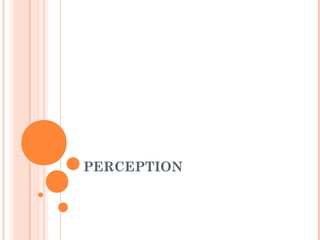Imd 151 Perception
•Download as PPT, PDF•
0 likes•302 views
This document discusses several perceptual processes that can influence how people perceive others. It describes implicit personality theory, where one's beliefs about personality can lead them to perceive qualities in others that conform to their theory, even if inaccurate. It also discusses self-fulfilling prophecy, where predicting a belief can cause that belief to become true if the prediction is acted upon. Additionally, it discusses primacy-recency effect, where initial impressions tend to have greater influence over perceptions than later impressions. Finally, it outlines risks of stereotyping, attribution biases, and other fixed perceptions that can ignore individual complexities and lead to inaccurate understandings of people.
Report
Share
Report
Share

Recommended
Recommended
More Related Content
What's hot
What's hot (20)
The full presentation - Giving and receiving feedback

The full presentation - Giving and receiving feedback
Similar to Imd 151 Perception
Similar to Imd 151 Perception (20)
HBO Handout Chapter 4 (Perception, Attribution and Emotions)

HBO Handout Chapter 4 (Perception, Attribution and Emotions)
More from isma ishak
More from isma ishak (15)
Recently uploaded
This slide is prepared for master's students (MIFB & MIBS) UUM. May it be useful to all.Chapter 3 - Islamic Banking Products and Services.pptx

Chapter 3 - Islamic Banking Products and Services.pptxMohd Adib Abd Muin, Senior Lecturer at Universiti Utara Malaysia
Recently uploaded (20)
UNIT – IV_PCI Complaints: Complaints and evaluation of complaints, Handling o...

UNIT – IV_PCI Complaints: Complaints and evaluation of complaints, Handling o...
How libraries can support authors with open access requirements for UKRI fund...

How libraries can support authors with open access requirements for UKRI fund...
Jose-Rizal-and-Philippine-Nationalism-National-Symbol-2.pptx

Jose-Rizal-and-Philippine-Nationalism-National-Symbol-2.pptx
plant breeding methods in asexually or clonally propagated crops

plant breeding methods in asexually or clonally propagated crops
INU_CAPSTONEDESIGN_비밀번호486_업로드용 발표자료.pdf

INU_CAPSTONEDESIGN_비밀번호486_업로드용 발표자료.pdf
Instructions for Submissions thorugh G- Classroom.pptx

Instructions for Submissions thorugh G- Classroom.pptx
Chapter 3 - Islamic Banking Products and Services.pptx

Chapter 3 - Islamic Banking Products and Services.pptx
Basic phrases for greeting and assisting costumers

Basic phrases for greeting and assisting costumers
1.4 modern child centered education - mahatma gandhi-2.pptx

1.4 modern child centered education - mahatma gandhi-2.pptx
Industrial Training Report- AKTU Industrial Training Report

Industrial Training Report- AKTU Industrial Training Report
Overview on Edible Vaccine: Pros & Cons with Mechanism

Overview on Edible Vaccine: Pros & Cons with Mechanism
MARUTI SUZUKI- A Successful Joint Venture in India.pptx

MARUTI SUZUKI- A Successful Joint Venture in India.pptx
Imd 151 Perception
- 1. PERCEPTION
- 2. PERCEPTION Process by which you become aware of the many stimuli impinging on your senses Five stages Stimulation Organization Interpretation-evaluation Memory Recall
- 3. PERCEPTUAL PROCESSES Implicit [hidden] personality theory Theory on personality that influence how you perceive other people Beware Can lead you to perceive qualities in someone that your personality theory tells you should present when they are not Can lead you to ignore or distort characteristics in someone that do not conform to your personality theory
- 4. PERCEPTUAL PROCESSES Self-fulfilling prophecy [forecast] Occurs when you make prediction or formulate a belief that comes true because you made the prediction and acted as if it were true Beware Can lead you to influence another’s behavior to conform to your prophecy Can lead you to see what you predicted rather than what really is
- 5. PERCEPTUAL PROCESSES Primary-Recency The relative influence of stimuli as a result of their order Primary – what occurs first exerts greater influence Recency – what occurs last exerts greater influence Beware Can lead to formulate a total picture of someone on the basis of initials impression that may not be accurate Discount/distort later perceptions to avoid disrupting initial impressions
- 6. PERCEPTUAL PROCESSES Stereotyping A fixed impression of a group of people that ignores their individual, unique characteristics Beware Can lead you to perceive someone as having group characteristics only and fail to appreciate the multifaceted nature of people and groups Can lead you to ignore unique characteristics of an individual and fail to benefit the special contribution each has
- 7. PERCEPTUAL PROCESSES Attribution [acknowledgement] The process by which you try to explain the motivation for a person’s behavior Beware Can lead you to the self-serving bias: you evaluate your own behaviors and take credit for the positive and deny responsibility for the negative Can lead you to over-attribution: single out one or two obvious characteristics of a person and attribute everything that person does to these characteristics Can lead you to the fundamental attribution error: you conclude that people do what they do because they do because that’s the kind of people they are and not because of the situation they are in
